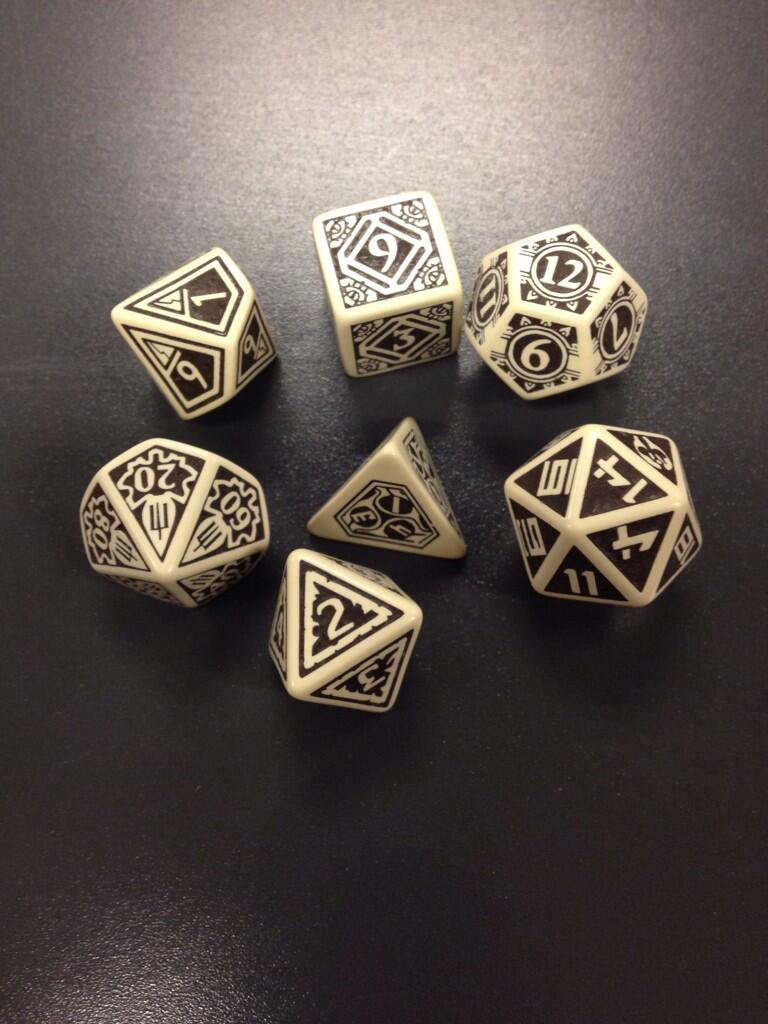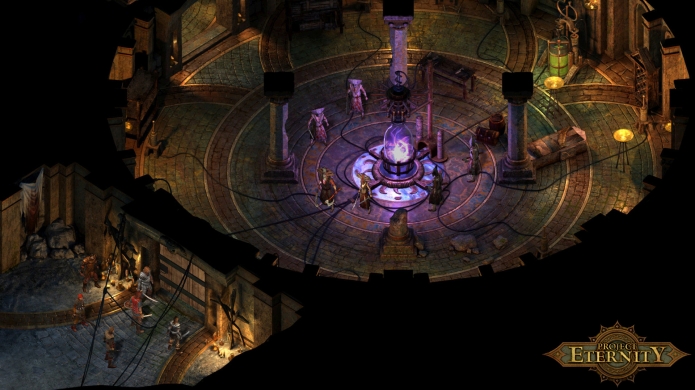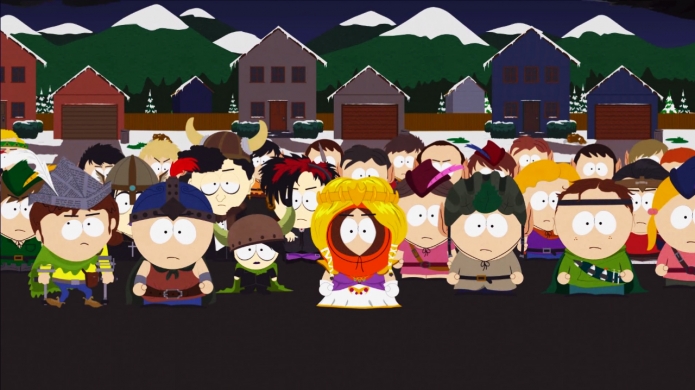Like South Park: The Stick of Truth. Except funny.
-
Welcome to rpgcodex.net, a site dedicated to discussing computer based role-playing games in a free and open fashion. We're less strict than other forums, but please refer to the rules.
"This message is awaiting moderator approval": All new users must pass through our moderation queue before they will be able to post normally. Until your account has "passed" your posts will only be visible to yourself (and moderators) until they are approved. Give us a week to get around to approving / deleting / ignoring your mundane opinion on crap before hassling us about it. Once you have passed the moderation period (think of it as a test), you will be able to post normally, just like all the other retards.
You are using an out of date browser. It may not display this or other websites correctly.
You should upgrade or use an alternative browser.
You should upgrade or use an alternative browser.
Obsidian General Discussion Thread
- Thread starter Duraframe300
- Start date
- Joined
- Jan 28, 2011
- Messages
- 97,484















Josh Sawyer on conlangs in Game of Thrones: https://www.facebook.com/jesawyer/posts/10152282561550600?stream_ref=1



Joshua Eric Sawyer via Robert Lee
i think it's cool that he puts the effort into developing the proto-languages, but without the context of those proto-languages existing outside of the primary medium (e.g. the GoT TV show), i don't think more than the tiniest percentage of extreme analytic linguists would find that the conlang "breaks down" in an unbelievable way.
e.g. english. without the context of understanding how old english, norman french, latin, and insular celtic languages started coming together in middle english etc., i think it would be pretty difficult for an isolated observer to reverse-engineer those steps to make sense of it. you're left with contemporary english, a mess of conflicting grammatical rules, some vestigial cased pronouns, bizarre modals, and thoroughly inconsistent spelling and pronunciation.
compare peterson's dothraki to GRRM's fragments of high valyrian. GRRM admits that he's not a linguist, so you get phrases like "valar morghulis". by process of elimination and comparison to "valar dohaeris", "valar" is the noun for "men" plus, presumably, some element indicating "all" and some element indicating that it's the subject. "morghulis" is the verb for "die" and logically must include what would normally be a modal or second verb indicating obligation/necessity.
it seems pretty unlikely that the language would be that compact, but because the body of high valyrian words and phrases used in the books is tiny, even extremely critical readers can do little more than shrug their shoulders and say, "sure, maybe."

Fixed that for you there Josh.Josh Sawyer on conlangs in Game of Thrones: https://www.facebook.com/jesawyer/posts/10152282561550600?stream_ref=1
Joshua Eric Sawyer via Robert Lee
i think it's cool that he puts the effort into developing the proto-languages, but without the context of those proto-languages existing outside of the primary medium (e.g. the GoT TV show), i don't think more thanthe tiniest percentage of extreme analytic linguistsanyone who studies any historical linguistics would find that the conlang "breaks down" in an unbelievable way.
Duraframe300
Arcane
- Joined
- Dec 21, 2010
- Messages
- 6,395
Carrie Patel was nice enough to post a pic of the Obsidian dice without using friggin' Instagramm.


Sensuki
Arcane
Someone should interview her about working on PE sometime. Would be interesting to know what it was like to come in halfway on the Project as a writer.
And Dura/C2B webstagram is good for viewing instagram pics.
And Dura/C2B webstagram is good for viewing instagram pics.
Delterius
Arcane
I remember reading the PoE thread and wondering myself when Roguey had become such a role model. If anything duraframe had long surpassed the older legends.I'm starting to suspect Duraframe set up hidden cameras all over Obsidian's offices and spends all his time watching the employees work and cackling to himself.
The work of one who consorts with beasts!
Dorateen
Arcane
Ha! That looks strategically adorable.
Hormalakh
Magister
- Joined
- Nov 27, 2012
- Messages
- 1,503
looks like Sawyer got a tattoo as well. From his twitter. http://i.imgur.com/jcsAmkU.jpg
Delterius
Arcane
And I used to make fun of the fact that you people know Sawyer's beard shaving cycles.looks like Sawyer got a tattoo as well. From his twitter. http://i.imgur.com/jcsAmkU.jpg
Sawyer has truly become the MJS.

cant be a tru fan of twin peaks unless u get a tattoo of a quote from it!!!!!!!
jdinatale
Cipher
- Joined
- Sep 28, 2013
- Messages
- 422
looks like Sawyer got a tattoo as well. From his twitter. http://i.imgur.com/jcsAmkU.jpg
No offense, but that's the most homosexual looking tattoo I've seen in a while. Looks awful. And I liked his forearm tattoos.
Delterius
Arcane
I believe the next 10 pages should be about the homoerotic tension that Sawyer's tattoo causes on jdinatale.
Isn't it supposed to be Gandhi, not Ghandi?looks like Sawyer got a tattoo as well. From his twitter. http://i.imgur.com/jcsAmkU.jpg
Gondolin
Arcane
The artist could've done a better job on Albert Rosenfield.
Wow, that's horrible. I'm all for making a beautiful picture as a tattoo, but a bad picture and some lines are not looking too good.looks like Sawyer got a tattoo as well. From his twitter. http://i.imgur.com/jcsAmkU.jpg
AW8
Arcane
Tattoos go against the word of God.
FeelTheRads
Arcane
- Joined
- Apr 18, 2008
- Messages
- 13,716
What do you think, Roguey? Would you tap that?
Shitty back-of-the-trailer-park tattoo! Hawt and manly!
Shitty back-of-the-trailer-park tattoo! Hawt and manly!

- Joined
- Jan 28, 2011
- Messages
- 97,484















Feargus interview: http://www.ausgamers.com/features/read/3428795
AusGamers Developer Interview with Obsidian Entertainment CEO Feargus Urquhart
Post by Dan @ 09:24am 08/04/14 | Comments
AusGamers chats with prominent games industry figure Obsidian Entertainment founder and CEO Feargus Urquhart about the upcoming Project Eternity, the recently announced Armored Warfare, the studio’s involvement in Russian MMO Skyforge, and more.
AusGamers: We’ve already heard quite a bit about Obsidian’s marketing and distribution deal with Paradox for Pillars of Eternity and it seems like a good fit, so I won’t probe too much on that topic, but just for our readers, can you explain what you perceive as the key benefits of that relationship for the game.
Feargus Urquhart: Well it’s one of those things that… after the Kickstarter, our plan was to publish it all ourselves, and a lot of that was partly because we used to work for a publisher, and we sort of said ‘ok, we can figure it out’, and we have friends that were in publishing, so ‘we’ll kind of figure it all out’.
As we started to think more and more, it was like: you know what? What would make sense is if we could just focus on the development, and then have a publisher, in essence, do distribution and marketing -- not be a traditional publisher, but just do distribution and marketing -- well that would helps us. They could do the fulfillment for the Kickstarter, they could do this, they could do that, and it would let us just focus.
That’s kind of how we started to really think about it. In particular, because… well I have to admit that I didn’t fully think about it a whole lot until I was talking to [Inxile Entertainment CEO] Brian Fargo, and he mentioned that he was looking at doing something a little somewhat similar -- maybe not as much of a relationship -- with Koch/Deep Silver for Wasteland 2. So it came up and I started to think about it and talk with people about it.
What seemed to make more and more sense really was that split of: we can make sure that we put all of our time and energy and money into the game, and then we also get this publishing partner, which to be honest, they have a lot more experience as an organisation doing distribution, doing marketing -- talking to distributors in China and stuff like that -- than we would have, or even have time to do. So it just felt like a good fit.
On top of the fact that they were entirely understanding -- and never challenged us at all -- that’ it’s our product, it’s our IP. There’s no joint ownership, there’s nothing like that. It’s ours and it’s our decisions when it comes to what’s going to be in the game and what’s not.
AusGamers: One thing I haven’t seen specifically mentioned, as far as I’m aware, is that traditionally, Paradox hasn’t distributed its games on GOG.com for whatever reason. Will your deal with Paradox affect the delivery of Pillars of Eternity on GOG, or anywhere else for that matter? Are there any other restrictions like that from the deal?
Feargus: No, there’s no restrictions at all. They have a responsibility to distribute wherever it can be distributed. In particular, they understood that we had already promised players and promised GOG that it would be distributed on their site. So that doesn’t change things at all.
AusGamers: Sequels and licensed titles have long been Obsidian’s bread and butter, but with South Park out the door now, all of your currently announced projects are actually brand new IP. Does that represent a strategic change for Obsidian going forward?
Feargus: Ultimately, we want to make cool games. If you look at the licensed games that we’ve made, we’re not like a movie license developers -- we don’t just take something like a Transformers movie and make a game that follows the story, we always take a license and create a new story, and new characters and a new experience within that license, and that’s making a cool game.
With an IP… that’s interesting. We’ve worked on our own IP before, and there’s definitely challenges with working on your own IP. But obviously when it comes to Kickstarter, this was our opportunity to create our IP and own it, which is very hard when you’re making the bigger games with publishers, because if a publisher is going to give you 15, 20, 30, 40, 50, 60 million dollars to make a game, there is just the expectation that they’re going to own that IP.
You may have some usage rights like right of first refusal to do sequels and stuff like that, but generally you’re not going to own it. So that does actually sort of reduce your… I don’t want to say desire to make original games, but you get to make a whole lot of stuff that you don’t get to keep. That’s where it’s been really cool with Kickstarter, is that we’ve been making something that we get to keep.
AusGamers: Peter Molyneux recently remarked on how the games industry is currently enjoying a golden age of independent development, but also suggested that he doesn’t expect that to last. Do you share that prediction or have any thoughts on that?
Feargus: You know, I hate to disagree with Peter, since he’s been doing this longer than I have and he’s a super-smart guy, but I would maybe broaden the conversation and say: well, look at music and look at films and this and that. Netflix isn’t even a traditional cable network or tv studio or whatever, and they make their own stuff, does that make them independent or not? And it doesn’t feel like that’s going to stop.
Increasingly, more and more music artists get popular super fast through Youtube and can just get their songs downloading on iTunes and Amazon and listed on Spotify. So looking at it in that vein, why would games be any different? Why couldn’t we continue to make our own games -- as long as we can get them funded -- and distribute them through things like Steam and GOG and all that? I have a hard time seeing that system going away.
Maybe I’m missing something and it could be that Peter can see farther than I do there, but I just don’t see that disappearing any time soon. It’s sort of like, the cat is out of the bag as it relates to people being able to distribute their stuff digitally.
AusGamers: Another notable point about Obsidians currently known projects is that they’re all PC-focused. What do you see as the key drivers for going PC-first, or what might be the main hurdles steering these kinds of games away from starting on consoles?
Feargus: It’s the console transition in a lot of ways. For a long time, the number of games that were being outsourced to independent developers on the console front… if you look at it historically, it shrinks every year. As a company we have to look at it like, we want to make games and we have to figure it out if we want to keep on doing it, and a part of it is if that means that we have to change right now, away from being a console developer, then we’re going to do that.
I almost liken it to -- not that our company has changed as fundamentally as this -- but if you look at Intel in the 80s, or late 70s/early 80s, they were a memory manufacturer that barely made microprocessors. Then they got undercut by the Japanese, and had to figure out how to have a whole new business, and of course that’s the future of Intel all about microprocessors.
So for us, it’s sort of like, this is the world right now: a lot of the big publishers do not have big console projects that they’re trying to outsource to developers, and when they do, they’re few and far between. You also need to look at it from the standpoint of: why do a lot of independent developers not seem to work with the same publishers right after each other? Because after they’ve made a game, they may not have another slot for another independent developer to do another game for them when they’re done, and they don’t have the 40 million dollars they want to invest at that time.
So the whole environment for big console development by independent developers has changed a lot over the past five years.
AusGamers: That said, both of the major console manufacturers have been making a lot of noise about wanting to bring more indies onto their new platforms. What aspects of those console platforms do you think could be improved to better open up to more independent development in the future?
Feargus: That’s interesting; I don’t know. Wow, you were able to stump me with a question. I don’t know, maybe if I look back at the Xbox 360 when it first came out, and you sort of had the marketplace, and a number of developers got up there and a lot of them actually became pretty successful, but then a lot of the success didn’t translate into necessarily continued success.
I don’t know, a lot of times I do look at the consoles, and I’m like ‘hey, I think people can make some cool’… maybe this is the way to look at it -- I’m going to completely go back to what I was saying -- in the end I look at: what do I go to, to play a certain game (so I’m not going to answer your question directly but say something else). When I want to play a big experience type game, I go to console. When I want to play some short session type game, I might do it on my tablet, I might do it on my phone; heck, I might do it on my Roku, or on my new Amazon thingy. When I want to play some super crazy builder RTS, numbers game, I play on my PC, although there’s some pretty good crossover between PC and console with things like Battlefield and Titanfall and all that kind of stuff.
So then how does that relate to how do the consoles be better? I don’t know, because I don’t know how many… I don’t want to say smaller experience games -- but games that have half a million dollars\two million dollar budgets -- how much of a place do they have on the Xbox and the PS4? I’m probably now shooting myself in the foot and going to get a call from Microsoft and Sony, but I don’t know. I guess I’m posing that as a question; I just don’t know. It’s a different experience, so I don’t know.
AusGamers: Well one thing recently, I think it was the developers of War Thunder mentioned that one of the things preventing them from coming onto the Xbox One was the lack of cross-platform play, which would reduce the risk of a small install base there for them.
Feargus: That’s a very good point. It’s funny because all of our games can do that inherently. I remember when we first had multiplayer working on Dungeon Siege 3, just for kicks, we had multiplayer games between a PC, PS3 and 360. So we did that, and then what did we have to do next? We had to cut the ties from each of the consoles, because you don’t do that.
So I don’t know. Particularly for their game [War Thunder], it’s all about having a big audience. For free-to-play in particular, if you can’t have a big audience and you can’t grow that audience fairly quickly, then your success on any platform is going to be limited, so I can totally understand they would want… their success would be more guaranteed if they could have cross platform play.
AusGamers: The recently announced Armoured Warfare seems like quite a big departure for Obsidian. Is that still your core of largely RPG-experienced developers that are working on that project, or more of a new team?
Feargus: It’s a little bit of both. We have a lot of people that have worked here for many years, and like anywhere, there’s lots of fans of League of Legends and World of Tanks and DotA 2 and DotA and all that sort of stuff. So in particular: someone who has worked for us since we started the company, is a guy named Rich Taylor; this is the stuff he loves. He’s even been programming these style of games since I think before he could drink, or drive.
As an example, he has 8000 games of World of Tanks under his belt, and he has contributed to every single game that Obsidian has shipped. So when this opportunity came up, he seemed like a great guy to put on it. We kind of moved people over onto it who were interested in working on it, then we fleshed out the rest of the team with other people that were interested in coming to work at Obsidian on it.
So what’s been really good is that we’ve been able, over the course of about 18 months, 19 months, something like that… sorry 21 months [laughs], we’ve been able to really take our time at building a team of people who understand free-to-play, and understand making big maps for super-fast tanks to run around and shoot far at, and it’s worked out pretty well.
AusGamers: And that’s with the same Russian publisher [My.com] that you guys are involved with for the Skyforge MMO, is that correct?
Feargus: That is correct, yes.
AusGamers: Are you able to elaborate on Obsidian’s involvement on Skyforge at all?
Feargus: Yeah, the thing is since we were already working together as two companies, and they’re kind of starting to set up their presence in America, and what they just wanted help with is, they said: ‘well, you already have all of the development infrastructure setup and all that kind of stuff, could we work on having you have a small team there, that in essence does sort of the Westernisation, and some work on the actual game itself there?’
They very much work very directly with that team, because it’s a team [at Obsidian] that’s never going to grow more than like 10 or 12 people, and there’s more than 200 people [at developer Allods Team] working on the game in Russia, and they’re the lead on the game. So really, a lot of it is us sort of helping them out. Also, for me it’s great learning a little more about that world of games.
AusGamers: Lastly, a lot of other independent studios have been expressing their optimism on the recent developments in virtual reality tech, and I’m sure that will get louder following the recent Facebook news. I don’t expect you can offer any specifics, but I was wondering if Obsidian has been doing any R&D with VR at all, and what your own personal thoughts are on the potential future there?
Feargus: Well right now, it makes me sick! [laughs] I’m one of those people that working with VR as it is today, it makes me sick pretty quickly. The Oculus guys were here probably 18 months ago, right around our Kickstarter and just after theirs, they came in and were showing off their stuff and it was super cool.
It’s hard to… I don’t know, and I’m maybe sometimes the wrong guy to ask questions about those kind of things. I’m good at making calls on games; hardware I’m worse at. I’m the guy that when Nintendo announced they’re going to make this Game Boy with two screens, and I’m like “What? That just sounds stupid”, and “Why is two screens better than one? That’s not going to go anywhere”. Of course you know, 250 million units later…
But I think with the Oculus, or any VR, it’s going to depend a lot on the software that really utilises it. It’s the same when you look at things like Kinect, it’s all based on the software that utilises it. If software really utilises the hardware really well, and it adds to the game, awesome. If you’re just bolting on hardware [to] something else just so you can say… I think that’s where it’s just going to feel like, well, I’m just going to take that off and use my TV and controller and I’m not going to try and live in this world now.
I think ultimately, there’s going to be software, and there’s going to be experiences, when VR gets to another stage, I think is going to be awesome, and hopefully not make me sick, but it’s not going to be a replacement, I think at all, for your standard playing of a game.
AusGamers: Ok, well thanks so much for your time today.
Feargus: Absolutely.
I was wondering if Obsidian has been doing any R&D with VR at all, and what your own personal thoughts are on the potential future there?
Feargus: Well right now, it makes me sick! [laughs]
Shd've just stopped there.
- Joined
- Jun 4, 2010
- Messages
- 3,517


looks like Sawyer got a tattoo as well. From his twitter. http://i.imgur.com/jcsAmkU.jpg
Very considerate man when it comes to RPG systems design, perhaps even too much so at times; not so much when it comes to applying pictures to his skin for the rest of his life.












![The Year of Incline [2014] Codex 2014](/forums/smiles/campaign_tags/campaign_incline2014.png)
![Glory to Codexia! [2012] Codex 2012](/forums/smiles/campaign_tags/campaign_slushfund2012.png)










